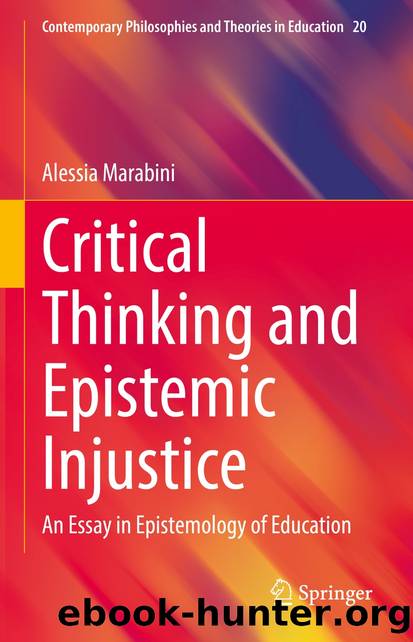Critical Thinking and Epistemic Injustice by Alessia Marabini

Author:Alessia Marabini
Language: eng
Format: epub
ISBN: 9783030957148
Publisher: Springer International Publishing
4.3 The SiegelâWilliams Debate on the Value of Critical Thinking
An even more recent debate about Siegelâs positions arises from the critical reflections of Emma Williams. In her article âIn Excess of Epistemology: Siegel, Taylor, Heidegger and the Conditions of Thoughtâ (2015), Williams raises some radical objections against Siegelâs thinking by proposing an alternative to the classical view of critical thinking. Williams examines the conception that she defines as hyper-epistemological of critical thinking proposed by the philosopher.
While Siegel refers to a conception of critical thinking based on reasons, critical thinking does not appear like this within a Heideggerian and Taylorian vision such as that defended by Williams, focused on a different and ânon-technicalâ vision of thought.
In the first place, Williams criticises the clear separation that Siegel places between truthâunderstood as the aim of knowledgeâand rational justification. For Siegel, while always aiming at the truth, justification may never come to coincide with the truth, given that a justified belief can nevertheless be false. While truth figures as an absolute and independent notion, justification, on the contrary, is always relative to the beliefs or point of view of the agent. Nonetheless, Siegelâs thesis predicts that belief may beâalbeit fallibleâan indicator of truth. In this way Siegel characterises critical thinking as a practice built on the justification of our beliefs as attempts to arrive at the truth. A use of this version of critical thinking, based primarily on a methodological approach has, however, for Williams substantial implications for the theories of knowledge that should not be underestimated.
Starting from an analysis of the underlying notions, Williams supports a conception of thought inspired by the ideas of Charles Taylor (1997). In addition to being an alternative method of understanding thought, Taylorâs theory provides an image of the human being that starts from Heideggerâs positions. Only through a review of critical thinking in this sense would it be possible to do justice to the conditions of receptivity and responsibility that characterise human thinking (Williams, 2015, p. 143).Williams re-introduces Taylorâs project with the intentâalthough not exclusiveâof âchallengingâ classical epistemology and some of its classic issues. The challenge is addressed, even earlier, to a certain system of metaphysical assumptions that have always inhabited the territories of epistemology. Firstly, the fact that classical epistemology includes a representational conception of human thought; secondly, the excessive emphasis on the methodological and technical aspect as a tool to reach the truth; finally a vision of the human being as an autonomous and self-reflective subject. At the basis of these ideas, according to Williams, there is the further assumption that there is a correspondence between thought and the world, easily reachable through a series of steps that would give a correct order to thoughts. Taylor, drawing inspiration from Heidegger, proposes on the contrary a conception of critical thought capable of eluding the problematic aspects of this methodological assumption. Siegel, after a previous response to Taylor (Siegel, 1998, p. 28), argues that the objections raised by the philosopher are harmless or irrelevant because they leave epistemology âas it isâ (Williams, 2015, p.
Download
This site does not store any files on its server. We only index and link to content provided by other sites. Please contact the content providers to delete copyright contents if any and email us, we'll remove relevant links or contents immediately.
Spare by Prince Harry The Duke of Sussex(5175)
Navigation and Map Reading by K Andrew(5150)
Tuesdays with Morrie by Mitch Albom(4769)
Machine Learning at Scale with H2O by Gregory Keys | David Whiting(4292)
Cracking the GRE Premium Edition with 6 Practice Tests, 2015 (Graduate School Test Preparation) by Princeton Review(4277)
Never by Ken Follett(3937)
Goodbye Paradise(3798)
What It Really Takes to Get Into Ivy League and Other Highly Selective Colleges by Hughes Chuck(3744)
Fairy Tale by Stephen King(3370)
Harry Potter and the Prisoner of Azkaban (Book 3) by J. K. Rowling(3347)
Pledged by Alexandra Robbins(3170)
Kick Ass in College: Highest Rated "How to Study in College" Book | 77 Ninja Study Skills Tips and Career Strategies | Motivational for College Students: A Guerrilla Guide to College Success by Fox Gunnar(3116)
Reminders of Him: A Novel by Colleen Hoover(3092)
A Dictionary of Sociology by Unknown(3073)
Sapiens and Homo Deus by Yuval Noah Harari(3064)
The Social Psychology of Inequality by Unknown(3018)
Graduate Admissions Essays, Fourth Edition: Write Your Way into the Graduate School of Your Choice (Graduate Admissions Essays: Write Your Way Into the) by Asher Donald(2907)
Will by Will Smith(2907)
Zero to Make by David Lang(2777)
